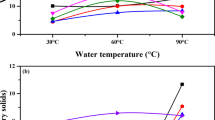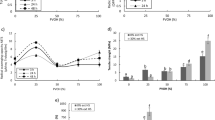Abstract
Volatile formation is an inevitable result of lipid oxidation, which impact the quality of lipid rich foods. In this study, moisture role on the formation of volatiles were evaluated using deuterium oxide (D2O) and possible steps of moisture involvement were suggested. Moisture content in corn oil with deuterium free water (H2O) was significantly (p < 0.05) higher than that in corn oil with D2O. The contents of some volatiles including pentane, hexanal, 2-hexenal, and t-2-heptenal in corn oil with D2O were higher than those in corn oil with H2O for the first 8 days. Volatiles containing deuterium appeared in the order of pentane, t-2-pentenal, and t-2-heptenal during oxidation. Deuterium incorporated volatiles could be formed after the β-scission of lipid hydroperoxides. Therefore, moisture plays important roles in the formation of volatiles as well as the locations of oxidation in bulk oils.



Similar content being viewed by others
References
Abdalla AE, Roozen JP. Effect of plant extracts on the oxidative stability of sunflower oil and emulsion. Food Chem. 64: 323–329 (1999)
Chaiyasit W, Elias RJ, McClements DJ, Decker EA. Role of physical structures in bulk oils on lipid oxidation. Crit. Rev. Food Sci. 47: 299–317 (2007)
Chen B, Panya A, McClements DJ, Decker EA. New insights into the role of iron in the promotion of lipid oxidation in bulk oils containing reverse micelles. J. Agric. Food Chem. 60: 3524–3532 (2012)
Choe E, Min DB. Mechanisms and factors for edible oil oxidation. Compr. Rev. Food Sci. F. 5: 169–186 (2006)
Frankel EN. Lipid Oxidation. AOCS Press, Champaign (1998)
Frankel EN, Huang SW, Kanner J, German JB. Interfacial phenomena in the evaluation of antioxidants: bulk oils vs emulsions. J. Agric. Food Chem. 42: 1054–1059 (1994)
Frankel EN. In: Flavor Chemistry of Fats and Oils. Min DB, Smouse TH (eds). AOCS Press, Champaign (1985)
Frankel EN, Neff WE, Selke E. Analysis of autoxidized fats by gas chromatography-mass spectrometry: VII. Volatile thermal decomposition products of pure hydroperoxides from autoxidized and photosensitized oxidized methyl oleate, linoleate and linolenate. Lipids 16: 279–285 (1981)
Fritsch CW. Lipid oxidation-the other dimensions. Inform 5: 423–426 (1994)
Halliwell B, Murcia MA, Chirico S, Aruoma OI. Free radicals and antioxidants in food and in vivo: what they do and how they work. Crit. Rev. Food Sci. 35: 7–20 (1995)
Hofstetter TB, Schwarzenbach RP, Bernasconi SM. Assessing transformation processes of organic compounds using stable isotope fractionation. Environ. Sci. Technol. 42: 7737–7743 (2008)
Kim JY, Kim MJ, Lee JH. Role of moisture on the lipid oxidation determined by D2O in linoleic acid system. Food Chem. 146: 134–140 (2014a)
Kim JY, Kim MJ, Lee JH. Effects of deuterium oxide on the oxidative stability and changes of headspace volatiles of corn oil. J. Am. Oil Chem. Soc. 91: 623–628 (2014b)
Laguerre M, Bayrasy C, Panya A, Weiss J, McClements DJ, Lecomte J, Decker EA, Villeneuve P. What makes good antioxidants in lipid-based systems? The next theories beyond the polar paradox. Crit. Rev. Food Sci. 55: 183–201 (2015)
Lee JH, Decker EA. Effects of metal chelators, sodium azide, and superoxide dismutase (SOD) on the oxidative stability in riboflavin photosensitized O/W emulsion systems. J. Agric. Food Chem. 59: 6271–6276 (2011)
McClements DJ, Decker EA. Lipid oxidation in oil-in-water emulsions: impact of molecular environment on chemical reactions in heterogeneous food systems. J. Food Sci. 65: 1270–1282 (2000)
Nawar WW. Lipids. In: Food Chemistry. Fennema OR (ed). 3rd edn. Marcel Dekker, New York (1996)
Oh SM, Lee CK, Kim SH, Choi HS, Kim MJ, Lee JH. Oxidative stability and volatile formations in linoleic acid-D2O models in the presence of deuteron or electron donors. J. Am. Oil Chem. Soc. 94: 1385–1392 (2017)
Oh SM, Yi BR, Kim MJ, Lee JH. Effects of deuterium oxide on formation of volatiles in linoleic acid model systems at different temperatures and oxygen limitation conditions. Food Sci. Biotechnol. 24: 41–46 (2015)
Schwarz K, Huang SW, German JB, Tiersch B, Hartmann J, Frankel EN. Activities of antioxidants are affected by colloidal properties of oil-in-water and water-in-oil emulsions and bulk oils. J. Agric. Food Chem. 48: 4874–4882 (2000)
Acknowledgements
This research was supported by a Grant (NRF-2017R1A2B4002613) of the Basic Science Research Program through the National Research Foundation of Korea funded by the Ministry of Education, Science and Technology, Republic of Korea.
Author information
Authors and Affiliations
Corresponding author
Rights and permissions
About this article
Cite this article
Lee, C.K., Yi, B.R., Kim, S.H. et al. Volatile profiles and involvement step of moisture in bulk oils during oxidation by action of deuterium oxide (D2O). Food Sci Biotechnol 27, 1327–1332 (2018). https://doi.org/10.1007/s10068-018-0380-7
Received:
Revised:
Accepted:
Published:
Issue Date:
DOI: https://doi.org/10.1007/s10068-018-0380-7




